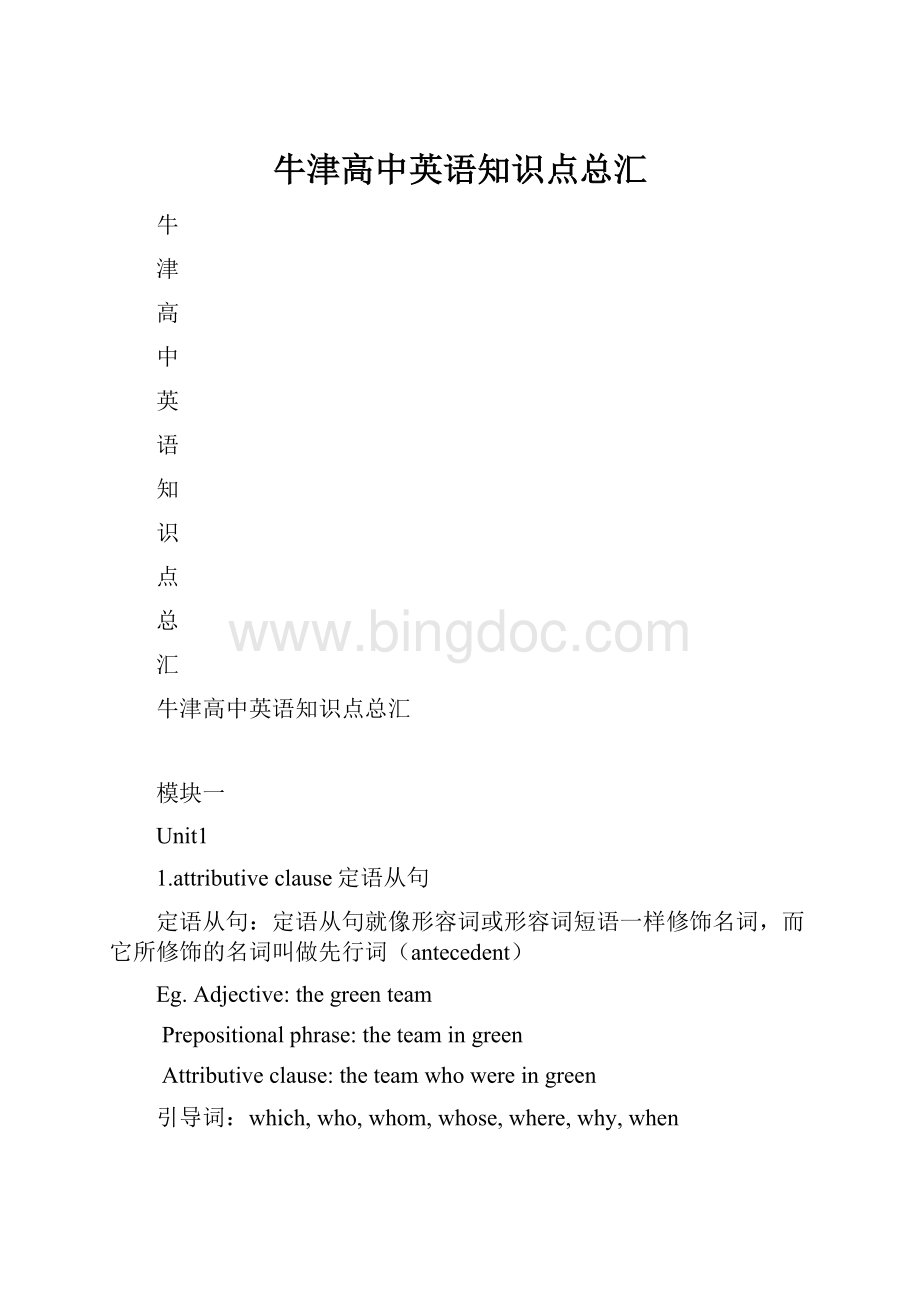牛津高中英语知识点总汇Word文档下载推荐.docx
《牛津高中英语知识点总汇Word文档下载推荐.docx》由会员分享,可在线阅读,更多相关《牛津高中英语知识点总汇Word文档下载推荐.docx(41页珍藏版)》请在冰点文库上搜索。

Thestudentwhomwesawjustnowisthebestrunnerinourschool.
做表语:
Jackisnolongeralazyboythatheusedtobe.
做定语:
ShehasabrotherwhosenameIcan’tremember.
做状语:
TheschoolwherehestudiesisinShenzhen.
(1)当表示事物时使用which或that
Eg.Thisisthestorythat/whichwewroteforourstorytellingcontest
注:
that较which用的更频繁且没有which正式
(2)who用来表示人
Eg.Thegirlwhoisthemonitorofourclasslivesnextdoortome.
(3)当先行词充当宾语成份时可用whom代替,whom更为正式
Eg.Thestudentwho/whomwesawattheschoolgateisfromAmerican.
(4)当先行词为不定代词sth,anything等时,只能用that.
Eg.I’lltellyousomethingthatIhaveheard.
(5)当表示物主关系时用whose
Eg.IsatnexttoagirlwhosenamewasDiane.
Unit2
一、介词+which/介词+whom
1.当使用介词造从句时关系代词who/whom为介词的宾语
Eg.Youweretobuydogfoodwiththemoney.Themoneyisgone.
Themoneywithwhichyouweretobuydogfoodisgone.
2.在非正式英语中,介词通常放于从句的末尾
Eg.TheMathsteacheristhepersonwhomIgotanAplusfrom.
3.如果介词位于从句末尾,whom/which可用that代替,whom可以被who代替
Eg.Dadisapersonwhom/that/whoIcaneasilytalkto.
4.当关系代词充当介词宾语时,介词放在句尾,which/whom可省略
Eg.Thetopic(which)Ericisinterestedinisphysics.
5.当inwhich/that放于way后面时,inwhich,that可以省略
Eg.Idon’tliketheway(that/inwhich)shetalkedtome.
二、关系副词when,where,why,
1.当先行词为time,moment,day,season,year等时使用关系副词when来引导定语从句
Eg.IoftenthinkofthemomentwhenIsawtheUFO.
2.当先行词为place,house,city,country,would等时用where
Eg.Thepolicesearchthehousewherethethiefhadstayed.
3.当先行词为reason时,用why
Eg.Idon’tknowthereasonwhythehouseissodirty.
4.在一些正式英语中,where,when,why,可用介词+which代替
Eg.Thestudyistheplacewhere/inwhichIoftenhavetalkswithmyfather.
Unit3
非限定性定语从句
1.为主从句增加一个额外的信息的句子,句子前使用逗号隔开
Eg.Mypillsareinthebathroom,whereIalwayskeepthem.
2.当前一个句子为整句,可用which去替代这个主从句
Eg.Hemissedtheshow,whichwasagreatpity.
3.使用all/someof+whom/which来表达全部或部分数量
Eg.Manypeople,someofwhomarenotoverweight,aregoingondiets.
4.反义疑问句
(1)当前一个陈述句为肯定句时,后面为否定反问
Eg.Wecanstillbefriends,can’twe?
(2)当主从句出现neither,none,nobody,nothing,few,little,never,hardly,seldom等这些否定意义的词时后面应跟肯定反问
Eg.NoonehasfoundmyCD,havethey?
(3)祈使句的反义疑问句用将来时
Eg.Let’shaveabreak,shallwe?
模块二
Unit1
1.现在完成时have/has+done
(1)我们用现在完成时来表达过去刚刚发生的动作,但与现在这个时刻相关(过去的动作影响现在的行为)
Eg.ThedisappearanceofJustinhasmadeKellyveryunhappy.
(2)谈论过去发生的动作并延续至今
Eg.IhavenotseenJustinsincelastFridaynight.
当一个行为动作的时间给出了,我们使用一般过去时,而不用现在完成时
Eg.JustindisappearedlastFridaynight.
(3)当遇到already,ever,for,just,lately,never,recently,since,yet时使用现在完成时
Eg.Thepolicehavejustfinishedsearchingthearea.
(4)也可以使用现在完成时表达重复性动作
Eg.SomevillagerssaythattheyhaveseenUFOmanytimes.
2.现在完成进行时
(1)我们通常用现在完成时来谈论过去发生的动作并且现在还在进行着
Eg.IhavenotbeensleepingwellsinceIreturnedhome.
(2)使用现在完成进行时来谈论已经完成的动作但仍以某些方式与现在相关
Eg.Kelly:
SorryI’mlate,haveyoubeenwaitinglong?
Mavis:
Yes,I’vebeenwaitingforanhour.
2.现在完成时与现在完成进行时
(1)现在完成进行时谈论不久前刚完成的动作,现在完成进行时表示过去进行的动作但仍在继续进行着
(2)现在完成进行时描述重复性的动作,现在完成进行时描述未停止过的动作
我们常使用“howmany/howmuch”对现在完成时提问,使用“howlong”对现在完成进行时提问
(3)我们使用状态动词(stateverb)或行为动词(actionverb)表达现在完成时,但现在完成进行时中只有行为动词
Someactionverb:
do,go,play…
Somestateverb:
like,know,exit…
Eg.Ihavehad(sateverb)thiscameraforfiveyears.
Ihavetaken(actionverb)photosofUFOswiththiscamera.
1.将来进行时will(not)be+verb–ing
用将来时谈论将来一段时间继续进行的动作
(1)一个动作发生于一个点之前,之后还可能发生
Eg.TobywillnotbeinLondonnextTuesday.HewillbeclimbingintheHimalayas
(2)不带意图的描述未来,是想表明一些事将自然发生,不是说话者刻意安排的动作
Eg.TheweatherreportsaysthatitwillberainingwhenwearriveinLondon.
(3)礼貌性的询问关于别人将来的计划
Eg.WillyoubevisitingyouruncleinTanzamia?
2.过去将来时
(1)用过去将来时,在过去谈论将来的要发生的动作
Eg.Theysetoffat9.amandwouldreachtheairportanhourlater.
(2)表明过去的一个安排
Eg.Iwasgoingtoleave,butthen,itrained.
(3)意味着将来的动作真实发生
Eg.Thejourneythatwastochange,Toby’slifestartedinJulythatyear.
过去完成时
我们使用一般过去时来谈论过去的动作,但当这个动作更过去时,使用过去完成时
(1)用过去完成时提及说话时已经发生过的动作
直接引语中的过去时和过去完成时尅变为间接引语中的过去完成时
Eg.“Weemptiedthetombofeverythingitcontained”,saidCarter.
Cartersaidthattheyhademptiedthetombofeverythingitcontained.
(2)用过去完成时表达一个在另一个动作之前的动作,不是说这个过去的动作发生了很长时间
Eg.IhaddonemyhomeworkthismorningbeforeIwenttothemuseum.
(3)在过去完成时中常带此类时间词“when,after,assoonas,until,since,by,for,already…
Eg.ThenafewmonthsafterCardhadopenedthetomb,LordCarnarvonfellillwithafeveranddied.
模块三
Unit1
Introductiontonounclause(名词性从句:
名词性从句在句子中与n或n词组相同)
名词性从句做主语:
ThatIcanpaybackthehelppeoplegivememakesmehappy.
Whytheyhavenotleftyetisunclear.
It做形式主语
Itwasgoodnewsthateveryonegotbacksafely.
名词性从句做宾语:
在动词后:
Shesensedthatshewasbeingwatched.
在介词后:
I’minterestedinwhothattallmanis.
用it做形式宾语:
Weallthoughtitgoodnewsthatthefoghadfinallygone.
名词性从句做表语:
Myquestioniswhetherjackcanfindherwayhome.
名词性从句做同位语:
Thenewsthattheplanehadcrashedmadeussad.
名词性从句由that或if或whether构成疑问词来引导
Nooneknewif/whetherhelosthissightbecauseofanaccident.
Unit2
一,Nounclauseintroducedbyquestionwords
由疑问词引导的名词性从句
做主语:
Wheredoesapersoncomefrom?
Thiswillaffecttheirstyleofspeech.
Whereapersoncomesfromwillaffecttheirstyleofspeech.
做宾语
WhydoesEnglishhavesuchstrangerules?
Youcanbegintoseeit!
YoucanbegintoseewhyEnglishhassuchstrangerules.
作表语:
WhyisEnglishalanguagewithsomanyconfusingrules?
Thatisthereason.
ThatiswhyEnglishisalanguagewithsomanyconfusingrules.
在由疑问词引导的名词性从句中,疑问语序应转变为陈述语序。
在任何情况下,疑问词都不省略疑问词
二,Emptysubjectit(形式主语)
名词性从句做句子主语
ItiscertainthatwewouldnotbeabletounderstandoldEnglishtoday.
主语是不定式
Itishardtomasteraforeignlanguage.
主语是动词不定式v-ing
Itisfunwalkinginthecountryside.
2.It用在一些词前:
Seem/appear/happen/chance/turnout/prove
Itseemsthathespeakstwolanguages.
3.It+be+theWord/phraseyouemphasize+aclauseintroducedbythatorwho
Itwaslastnight(notanyothertime)thatIreadaboutthehistoryofEnglish.
Unit3
一Objectcomplement(宾语补足语:
对宾语作出进一步的补充或说明)
TheycalledhertheLoulanBeauty.
模式:
verb+object+objectcomplement
其形式经常以
名次词组或形容词出现
Theymadeprofessorzhangchairmanofthesociety.
动词不定式或不带to的动词不定式
Theybelievedhimtobehonest.
Professorzhang’sspeechmadeusalllaugh.
介词词组
Wefoundourselvesinthemiddleofadesert.
宾补与宾语在数量上保持一致
Shemadejoeherassistant.
Shemadejoeandsueherassistants.
二either…or…andneither…nor…表选择
1主语
Eitherannorjaneshouldhavearrivedbynow.
谓语
Peopleeithertiredtoescapeorstayedintheirhouse.
宾语
Wecouldchoosetoeateithernoodlesorrice.
状语
Theyaregoingtothemuseumeithertodayortomorrow.
2表否定
主语的否定
Neitherthemuseumnorthesiteitselfinterestedher.
谓语的否定
Theyneithertoldmethelocationnorshowedmethemap.
宾语的否定
Iateneitherthenoodlesnortherice.
状语的否定
Theywentthereneitherbytrainnorbyair.
3主谓一致
谓语动词必须在人称和数上与主语保持一致
Thecitywasfoundedinthe8thcenturyBC.
Twohoursistooshortforthevisit.
Bothcitieswereveryrich.
主语是allof/mostof/someof/halfof/apartof…+名词/代词,谓语与该名词或代词保持一致
AllofushaveattendedthelectureaboutPompeii.
Mostofthelecturewasabouthowtheancientcitywasdiscovered.
集体名词:
band/crowd/class/dozen/family/public/team…
主语表示一个组织或一个单位的概念时,谓语用单数
Ourteamisveryimportanttome.
主语表示个体的概念时,谓语用复数
Ourteamarenowtravellingtoxinjiang.
单词像news/physics/mathematics/aids..用单数
单词像goods/clothes/congratulations/earnings/remains/belongings.用复数
ThelatestnewsisthattheLoulanBeautyisbeingdisplayedinshanghai.
Alltheirbelongingsweredestroyedintheearthquake.
就近原则
Either…or…/neither…nor…/notonly…butalso…/not…but…
Eithertheteamleaderortheguidesarelookingafterthestudents.
Eithertheguidesortheteamleaderislookingafterthestudents.
模块四
Unit1
Directspeechandreportedspeech
用自己的话说别人的话不用引号
Shesaid,’chinahasbeenusingPSAstoeducatepeople.
ShesaidchinahadbeenusingPSAstoeducatepeople.
通常把直接引语变为宾语从句或动词不定式
Shesaid,‘I’musedtoads.’
Shesaidthatshewasusedtoads.
人称代词的变化:
一主二宾三不变
Shesaid,‘Ididsomeresearch.’
Shesaidthatshehaddonesomeresearch.
时态的变化
Shesaid,‘thisadisveryclever.’
Shesaidthatthatadwasveryclever.
一般现在时—一般过去时
现在进行时—过去进行时
一般过去时—过去完成时
现在完成时—过去完成时
一般将来时—过去将来时
过去完成时—过去完成时
现在完成进行时—过去完成进行时
间接宾语
statements(陈述句)用that引导
Shesaid,‘Advertisementsareanimportantpartofourlives.’
Shesaidthatadvertisementsareanimportantpartofourlives.
动词除了“say/tell”还有advise/agree/explain/insist/promise/remind/suggest/warm
Question:
疑问句
用“whether/if”引导的名词从句回答Yes/No的问题
MattaskedAnn,‘Areyouthehappiestpersonintheworld?
’
MattaskedAnnwhether/ifshewasthehappiestpersonintheworld.
用wh-words引导的名词回答:
“wh-questions”
Iaskedher,‘howcanthatbetrue?
Iaskedherhowthatcouldbetrue.
ImperativeSentences:
祈使句
V+object+(not)+动词不定式
Thewritersaid,‘Thinkaboutwhyyoushoulddothethingstheadsuggests.’
Thewritertoldustothinkaboutwhyweshoulddothethingstheadsuggested.
用advise/encourage/invite/remind/warn
Don’tbelieveeveryadvertisementyouread:
Michellesaidtome.
Michelle